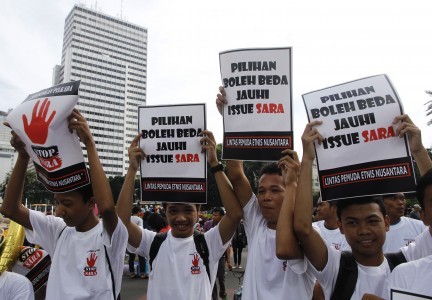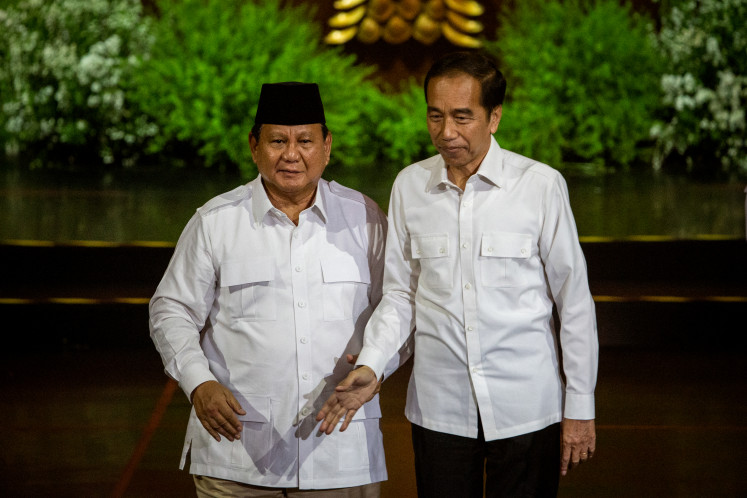Popular Reads
Top Results
Can't find what you're looking for?
View all search resultsPopular Reads
Top Results
Can't find what you're looking for?
View all search resultsSaving democracy from divisive rhetoric in Jakarta election
To show their commitment to unprejudiced democracy, other running candidates Anies Baswedan and Agus Harimurti Yudhoyono should do more than to refrain. They should actively condemn such practices and to renounce support from groups or people who commit them. Would Anies and Agus dare to do that?
Change text size
Gift Premium Articles
to Anyone
W
hen Indonesian Ulema Council (MUI) declared their stances in the controversy involving a statement by Jakarta Governor Basuki “Ahok” Tjahaja Purnama on the interpretation of Al-Maidah 51 of the Quran, it can be implied that this is a call for Muslims to refrain from voting for candidates of other religions.
The lack of political opposition from the government means that this move is one step short from government-sanctioned discrimination against minority religions.
Ahok and the Al-Maidah 51 controversy is only the latest of a string of political rhetoric that risks triggering horizontal societal division in the country. United Development Party (PPP) chairman Muhammad “Romi” Romahurmuziy called for a constitutional amendment to limit the presidency for people of “native Indonesian origin”, a term vaguely defined that could be used arbitrarily and unfairly.
Earlier still, in the 2014 presidential election, divisive tactics were also employed to split the nation along ethnic and religious lines, attacking both sides of the ballot. There was a hoax of President Joko “Jokowi” Widodo being secretly a Christian of Chinese descent. On the other side of the ballot, there were also misguided Jokowi supporters who repudiated Prabowo Subianto due to Christians in his immediate family. This tactic aimed to appeal to the more chauvinist Muslims of the Javanese majority.
Supporters of this potentially divisive rhetoric cite principle of majority rule in democracy as their philosophical foundation. They also attempt to bend principles of democracy, claiming that democracy disallows minority to rule over the majority. In democracy, the only relevant majority is majority of the vote, with demographic majority being irrelevant. Regardless of demographic attributes, if a candidate is supported by the majority of voters, he or she has the right to rule.
Nationalism is another popular argument to support this divisive and discriminatory rhetoric. In social media many allege that Indonesians of foreign descent, such as Chinese-Indonesians, collude with foreign interests through the popular use of the term ‘aseng’—a slang term derived from the Indonesian word for foreign: asing. Others cite the “native Indonesian” nature of their religion or ethnicity as reasoning for discriminating against others. They argue because of their “native origin” some ethnicities or religions are inherently more nationalistic.
However, it is incredibly difficult to define what is “native Indonesian”. Anthropologically, Indonesian people are Austronesian, meaning that we share ancestry with most other Asian peoples, as well as Madagascar in Africa. Culturally, almost all Indonesian cultures have received some sort of foreign cultural influence: be it Indian, Persian, Turkish, Arabic, Chinese or European. The same is true for religion as none of the six religions acknowledged by the government, are of “native Indonesian” origin.
The concept of a unified Indonesian nation was conceived based on our common struggle against the Dutch. By staying here and taking up Indonesian citizenship, all Indonesians of Chinese, Indian, Arabian, European, or any other foreign descent acceded to that common struggle and should be treated no differently from a Javanese or Sundanese. This is especially true for their descendants who have never witnessed the land of their ancestors and have lived their entire lives as Indonesian citizens. The same applies for religion.
It is understandable in democracy for a voter to consider a candidate’s demographic attributes in voting. The problem is if religion and ethnicity becomes the “main” or “only” criteria when choosing a candidate.
The most important consideration should be a candidate’s political platform. A platform is not simply vague promises, but rather a detailed plan to make them reality. The second consideration is a candidate’s ability to implement these programs. It includes the candidate’s technical capacity to govern, their leadership skills, track record in public office, and trustworthiness. At the end of the day, a voter should vote for the best possible programs that aims at achieving almost unanimously agreed goals. That is the way of an ideal democracy.
To judge a candidate based on religion or ethnicity is unjustifiable in a democracy. If such practice is promoted and accepted by society, democracy will turn into tyranny of the majority. When the government fails to protect a minority from such practices or worse actually promotes it, the government has acted partially and violated human rights.
The use of divisive rhetoric to appeal to a certain identity of voter is a sign of imperfection in our democracy. Our political elite only promise dreamy results without detailing their platforms on how they plan to achieve it. Our media support such an environment as they rarely put the spotlight on a candidate’s promised programs, or lack thereof, and instead focusing on the candidate’s personal life, background and scandals. The general lack of political education among the populace result in voters’ inability to critically scrutinize a candidate’s platform themselves. This atmosphere allows populist rhetoric that appeal to voters’ emotion by building a misguided “us versus them” mindset.
The Jakarta 2017 gubernatorial election will be front and center in addressing this issue. For the first time, Indonesia has a frontrunner candidate of double minority status, a Christian Chinese-Indonesian in a region dominated by Muslim of Javanese, Betawi, and Sundanese ethnicities. For this candidate to win or lose is beside the problem. Whether he wins or loses not based on his demographic attributes will gauge the credibility of Indonesian democracy. Jakarta could be seen as a microcosm of Indonesia with its demographic diversity and to achieve such a feat here would strongly suggest that the dream of a perfect Indonesian democracy is still alive.
This is a hard target considering Indonesian democratic atmosphere is far from perfect. For Ahok’s opponents to not inflame the divisive rhetoric would not be enough to quell the controversy. The flame has burnt for far too long and too fiercely. To enjoy support from inflammatory groups while refraining to commit discriminatory remarks is to be hypocrite. It is tacit support that makes such actions acceptable—even necessary—to win an election. To show their commitment to unprejudiced democracy, other running candidates Anies Baswedan and Agus Harimurti Yudhoyono should do more than to refrain. They should actively condemn such practices and to renounce support from groups or people who commit them. Would Anies and Agus dare to do that?
***
Gede Benny Setia Wirawan is a medical student in Denpasar. Apart from health sciences, he is also interested in politics and human rights issues. You can find him at his favorite hangout reading news, watching movies, or studying for exams. Find him in Instagram @bennywirawan.
---------------
We are looking for information, opinions, and in-depth analysis from experts or scholars in a variety of fields. We choose articles based on facts or opinions about general news, as well as quality analysis and commentary about Indonesia or international events. Send your piece to community@jakpost.com. For more information click here.










